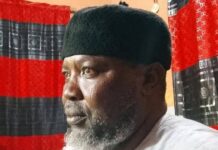It is again a new year of Islam, and the tenth of Muharram, AH comes with much lessons and memories. It marked Ashura, the Muslim festivity observed by voluntary fasting. It was conspicuous only in Karbala, Iraq, where Shiite pilgrims shed self-blood, every year, to the wonder of the world.
I must take immediate shield to say that I am not a Shiite. I am a Sufi but I share with the Shiite the love of, and respect to, Prophet Muhammad’s (SAW) family, Ali (RA) family.
The significance of Ashura transcends the divides within Islam, and like Islam, it has a universal value for all mankind, cutting across all the prophets of God. Ashura is a day of both safety and struggle, in which God saved Prophet Musa (AS), Moses, from Pharaoh’s enmity.
Israelites kept the date in fasting ever since and the Prophet Muhammad said he had the better reason in Moses and fasted on the day. Beyond Musa (AS), Ashura was also the date God saved many other prophets from different debacles at their time.
But Ashura is also a living tragedy. The anniversary opens the deep wounds of agony in Islamic history. It was one of the darkest days of Islam in which the Prophet’s family lost Alhussain, the grandson of the Prophet, son of Fatima, the Prophet’s cherished daughter of whom he said, “Fatima’s happiness is from mine. Whoever pleases her pleases me.”
Fatima was nicknamed Alzahraa because she was spared menses all her life. Two women in the world were spared menses: Maryam Albatul, Jesus’ mother, and Fatima. She delivered Alhussain after sunset prayer, stood up, washed and prayed her night. Muslim women pray only after their period.

Their father was Ali (RA), the Prophet’s cousin whose face was glorified for being the only one of the Companions who never bowed to any poly deity. He was the first to dig wells in the holy land for pilgrims to drink from. During his time, Fatima’s and Ali’s little children – Alhassan and Alhussain – were part of the Prophet’s private happiness, played around him.
Let me share with you the story of Hussain’s last days told in one of Sheikh Abdulhameed Kishik’s classical Jumaat Sermon episodes. Sheikh Kishik was an Egyptian cleric whose vocal voice still resonates in media forms across the Arab speaking world, almost 14 years since he died in 1994. In it, you – everyone – may find a bleeding heart in a hardened life.
Abdullahi Ibn Abbas wakes up one morning reciting the heart-pounding verse, “Inna Lillahi wa Inna Ilaihi Raaji’uun”, usually said in the face of a debacle. His wife asks if all is well. He says, “I saw the Prophet (SAW) in my sleep last night (those who challenge this idea of seeing the Prophet in their sleep are also living with the challenge of the Prophet’s saying: … ‘who see me in their sleep actually see me’, because Satan does not imitate the prophet’s image).
“He came to me with a slain chicken, splashed with blood all over and said, ‘Ibn Abbas, this is the blood of Alhussain and his companions’”. It was Alhussain’s massacre and his companions previewed through a great mediation of the pious’ divine communication, a divine premonition if you like.
It is the year 61 AD, 50 years since the Prophet died and here it is the beginning of Muharram. Islam is at its critical time. Alhussain, the only living giant of the noble lineage, is not keen on the sought leadership of a caliphate but his everything from name to charm, humility, justice and the grace of his grandfather and father is a threat to the ruler of Iraq of the time – Alyazeed.
The people of Iraq are under the repression of Governor in Alyazeed and were looking up to Alhussain in Madina for leadership, want to submit their will, and it is the time. They send for him. It is a public call to the tradition of leadership and responsibility he inherited. So he wants to meet a people yearning for him or his qualities they can’t find back home.
Alhussain meets a man called Alfarasdaq, who is just back from Iraq and ask him of the people there. “The people’s hearts are with you (Alhussain). But their swords are against you”, Alfarasdaq says. Sure, Alhussain was Fatima’s son, a complete gentleman who held the noble family’s baton of grace.
The Prophet (SAW) used to say, “’Hussain is a part of me and I am part of ‘Hussain. Allah loves who loves ‘Hussain. But Alhussain wants the people’s hearts now, not their swords – the clear case of fair judgment for a people yearning for his leadership.
He organises 72 persons – not an army in the actual sense because he’s not sure he’s going to war, the kind that gulps him – all of them from the prophet’s extended family – including women and children, leads them on the mission to Iraq. On the way, he stops at the Prophet’s tomb to pay his respect.
In the company is Zainab, his sister. When she’s born, Ali referred to the Prophet for her naming. The prophet said, “I cannot name her before Allah.” In a minute, the Archangel Jibril descended on the Prophet, and said, “The Peace brings you peace and asked you to name the baby Zainab”.
There are also Alhussain’s children – Ahassan, named after his brother; Abubakar and Alqassim as well as Alhassan’s son, Ali, named after their father. They arrive at camp near Karbala, in Iraq, beside the Furaat River. The settlement’s heart is Zainab’s castle. She sits up to unweave her hair, preparing to mourn the next lap of her heartbreaks. Alhussain lies beside his sister to take a nap.
He wakes minutes later with another bad news. “I met the Prophet (SAW) in my sleep this hour. He told me I will be with them shortly”, ascertaining the countdown to his martyrdom. Zainab breaks down in tears, contemplating how she will face this devastation. It is clear to her that her only living brother, the breadwinner of the prophet’s family – dear Hussain – is leaving her behind for the great beyond.
It is such hard on her. She has lost so much in her life. Her mother, Fatima, died when she was only five. Her father was stabbed in a mosque in Kufa, Iraq, during a morning prayer. She lost her brother Alhassan to poisoning. For some years now, Alhussain was all she had left.
He was the last tree of this great family reputed for putting forth martyrs. The family lost Hamza (RA) in the battle of Uhuud. Then the Prophet’s departed after years of struggle; Ali was stabbed in a Kufa mosque during morning prayers; Alhassan was poisoned, and now Alhussain is lost to the battle of Karbala.
He wants to take it all by himself and to spare the rest of his company from the looming tragedy. Yes, they are innocent but what was Alhussain’s crime? He tells them to return home since the enemy is only interested in him. They say, “what do we tell the Prophet if we return and leave you behind you”, and throng behind him to the end.
Alyazeed’s is a classical corrupt rule. He losses the people’s confidence but bought it back with money. He was able to buy their hearts. And Alhussain had no money. He hired an army numbered 400, commanded by his imbecile agent in Kufa province, Ibn Ziyaad. They close up on Alhussain’s little, amateur army of only heartful few men, women and children.
Alyazeed and Ibn Ziyaad are worse than each other in treachery. What do they want from Alhussain? The root of the conflict is currently no-go zone for discourse among Muslim scholars because of the matter between the house of Muawiya and that of Ali, both key companions.
The former was a personal scribe to the Prophet and the second a cousin and in-law. I hope that this piece will find a place in the frame of belief of our readers. But this was a matter of serious crime perpetrated by a Governor wanting in leadership, against an innocent soul and people. It was a betrayal of truth and justice that murdered innocents.
In the heat of the battle, Ali Ibn Alhussain, the brave youth, goes up to challenge the special squad taking on his father. In a moment, he is cut down. And Alhussain emerges from the battle with his slain son in his arms, gushing wounds rushing to Zainab, who comes out of the castle to receive her nephew martyr. The father looks in anguish, tears cascading.
Then the other brave young man Alqassim, shouting from somewhere in the battle dust, is calling out to his father, “I am thirsty. I need water.” Part of Alyazeed’s battle strategy is to deny Alhussain and his people water, while the Furaat is just flowing full by. Alhussain was answering his son in silence, “wait Qassim, very soon you will drink from your grandfather’s spring.” The boy dies thirsty.
It is the world. The innocent needy is dying of hunger and the rich are dropping meat to dogs. The poor intellectual is sleeping on mats while the ignorant official is idling in gold and diamond homes. That was Alhussain’s bravery. Yes, he was the son of Ali, renowned for his dogged struggle against falsehood.
He lost two sons already and is now bleeding from 180 wounds, his body already bare in tattered remains of his grandfather’s gown he wore that day. But he is now more faithful in Allah than ever. The other order from Alyazeed was to bring Alhussain’s head.
And the decapitated body is run over by the horses, mutilating into pieces. They can be as heartless as the mountains, but the Qur’aan reminds us that even mountains are soft sometimes. They spring water.
They carry the noble head back to the Palace. Alyazeed looks at the head and takes convenience in one of the Qur’aan verses: “whatever happens to you is from your own deeds”, the exact way some Muslims today take reckless excuses for their misdeeds in parts of the divine message to justify corruption and injustice.
Little Ali, the son of Alhassan, one of the battle survivors, steps forward to challenge the Governor: “you lied, oh tyrant, ‘whatever happens to you is from Allah’.” Angered by the challenge, Ibn Ziyaad ordered his men to kill the boy.
And the warrior of Karbala, Zainab, jumps up to him, fuming like a lion. She stands between the murders and the boy. “If you want to kill him, kill me first. I cannot bear the murder of my nephew anymore.”
Zainab lived only a year after, having been indoors meditating since her brother and the kids died before her very eyes. Peace shall be with them. But Ibn Ziyaad died running in the bush eaten by prey. Shammar who beheaded the fallen body died of a hell of thirst. He would finish a pot of water and yet cry for more. And Governor Yazeed died a lunatic, not longer after Alhussain.
Alhussain is in the peace of his Lord. He stood up to the corruption and injustice of a Governor of place reputed for the elimination of the prophet’s family. Those who understand this modesty know how dear someone who struggled for the cause of the public, especially those in need can be with the Lord.
What have we learnt and kept from the Hussain value. His head is not in the fixed divisions that us apart and. It has been the same cruelty the world ever since. When Iraq and Palestine bleed, I think of the bloodshed in the prophet’s family. In a way, we are all bleeding in this world today.
I wrote this to send the idea that there is more to Islam that can bind Muslims, ensure justice to all humans and save the world. There is a message for everyone in all this.
Hassan Alhaji Hassan
08032829772/08050551220 (text only with full names and address)
abuna2406@gmail.com
Follow the Neptune Prime channel on WhatsApp:
Do you have breaking news, interview request, opinion, suggestion, or want your event covered? Email us at neptuneprime2233@gmail.com




